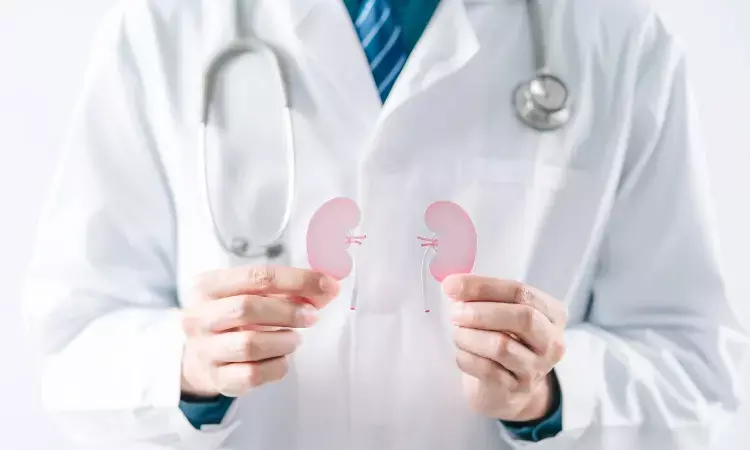- Home
- Medical news & Guidelines
- Anesthesiology
- Cardiology and CTVS
- Critical Care
- Dentistry
- Dermatology
- Diabetes and Endocrinology
- ENT
- Gastroenterology
- Medicine
- Nephrology
- Neurology
- Obstretics-Gynaecology
- Oncology
- Ophthalmology
- Orthopaedics
- Pediatrics-Neonatology
- Psychiatry
- Pulmonology
- Radiology
- Surgery
- Urology
- Laboratory Medicine
- Diet
- Nursing
- Paramedical
- Physiotherapy
- Health news
- Fact Check
- Bone Health Fact Check
- Brain Health Fact Check
- Cancer Related Fact Check
- Child Care Fact Check
- Dental and oral health fact check
- Diabetes and metabolic health fact check
- Diet and Nutrition Fact Check
- Eye and ENT Care Fact Check
- Fitness fact check
- Gut health fact check
- Heart health fact check
- Kidney health fact check
- Medical education fact check
- Men's health fact check
- Respiratory fact check
- Skin and hair care fact check
- Vaccine and Immunization fact check
- Women's health fact check
- AYUSH
- State News
- Andaman and Nicobar Islands
- Andhra Pradesh
- Arunachal Pradesh
- Assam
- Bihar
- Chandigarh
- Chattisgarh
- Dadra and Nagar Haveli
- Daman and Diu
- Delhi
- Goa
- Gujarat
- Haryana
- Himachal Pradesh
- Jammu & Kashmir
- Jharkhand
- Karnataka
- Kerala
- Ladakh
- Lakshadweep
- Madhya Pradesh
- Maharashtra
- Manipur
- Meghalaya
- Mizoram
- Nagaland
- Odisha
- Puducherry
- Punjab
- Rajasthan
- Sikkim
- Tamil Nadu
- Telangana
- Tripura
- Uttar Pradesh
- Uttrakhand
- West Bengal
- Medical Education
- Industry
The glycemic gap and stress glycemia ratio may predict ICU mortality in critically ill patients with AKI

In the original research, "Predictive value of glycemic gap and stress glycemia ratio among critically ill patients with acute kidney injury: a retrospective analysis of the MIMIC-III database", Wenkai Xia et al. and colleagues, said that the predictive value of glycemia at admission for ICU mortality in critically ill patients could be partially improved when the average chronic glycemia, as calculated by HbA1c, is also considered.”
This study is published in BMC Nephrology.
It is already known that Acute hyperglycemia is a risk factor for acute kidney injury occurrence and mortality in various diseases. In the present study, a team of researchers investigated the relationship between stress-induced hyperglycemia and adverse outcomes in critically ill patients with a history of AKI by extracting clinical data from Multiparameter Intelligent Monitoring in Intensive Care III version 1.4.
To calculate the glycemic gap and stress hyperglycemia ratio (SHR), researchers used Blood glucose and glycosylated haemoglobin during the first 24 h of ICU admission.
The outcomes measured in the study were ICU mortality and the need for renal replacement therapy.
The critical points of the study are:
Higher values were recorded for glycemic gap, and SHR in those with increased need for RRT, higher mortality rates and longer ICU stay.
There was an independent association between a higher glycemic gap and SHR with ICU mortality. The OR was 1.01 and 1.32, respectively.
The association of glycemic gap and SHR were only significant in the non-diabetic population as for the outcome of ICU mortality having OR 2.25 and 1.99, respectively.
Concluding further, they said, Based on the results of our study, glycemic gap and SHR might be potential prognostic indicators of ICU mortality in critically ill patients with AKI, especially in the non-diabetic population.
We found that both glycemic gap and SHR, instead of admission glycemia alone, were related to poor ICU outcomes, even after adjustment for important confounders, they noted.
Further reading:
https://bmcnephrol.biomedcentral.com/articles/10.1186/s12882-023-03278-z
BDS, MDS in Periodontics and Implantology
Dr. Aditi Yadav is a BDS, MDS in Periodontics and Implantology. She has a clinical experience of 5 years as a laser dental surgeon. She also has a Diploma in clinical research and pharmacovigilance and is a Certified data scientist. She is currently working as a content developer in e-health services. Dr. Yadav has a keen interest in Medical Journalism and is actively involved in Medical Research writing.
Dr Kamal Kant Kohli-MBBS, DTCD- a chest specialist with more than 30 years of practice and a flair for writing clinical articles, Dr Kamal Kant Kohli joined Medical Dialogues as a Chief Editor of Medical News. Besides writing articles, as an editor, he proofreads and verifies all the medical content published on Medical Dialogues including those coming from journals, studies,medical conferences,guidelines etc. Email: drkohli@medicaldialogues.in. Contact no. 011-43720751


